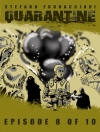Few books before ‘All Quiet on the Western Front’ dared to describe in such graphic detail the privations, challenges and horrors faced by soldiers in the thick of battle. Thus, upon the publication of the this book in 1928 (a quasi-autobiographical war novel by German army veteran Erich Maria Remarque), it became an immediate sensation and a publishing juggernaut, selling 2.5 million copies in 22 languages in its first 18 months in print.
Since then, it become a classic of the genre; a war novel that examines life on the front lines from the perspective of a soldier who has actually experienced the fears, triumphs and intense mental anguish soldiers typically endure. The book also provides a unique perspective on the difficulties soldiers face in returning from war and attempting to re-enter life as civilians. It is presented here in its original and unabridged format and includes a biography of the author.
About the author
Erich Maria Remarque was born Erich Paul Remark on June 22, 1898. A writer from an early age, he was conscripted into the German army and fought with the 15th Reserve Infantry Regiment on the Western Front during World War I until he was injured by shell shrapnel and transported to an army hospital to recover. from his injuries. Following the war, Remarque published his first novels under his given name – The Dream Room (Die Traumbude) and Station at the Horizon (Station am Horizont) – before embarking on his most famous work, All Quiet on the Western Front (Im Westen nichts Neues). In publishing this last work, he changed his name, adding the middle name ‘Maria’ to honor his mother and changing the spelling of his last name to reflect his French heritage and to distinguish himself from his earlier works. All Quiet on the Western Front became an international sensation and was translated into dozens of languages, catapulting Remarque into literary fame. The book essentially invented a new genre of writing, where veterans would write about their experiences in war, and Remarque – and after publishing his next book, The Road Back (Der Weg zurück), about the recovery from the war in Germany, used the immense proceeds from his books to buy a villa in Ronco, Switzerland. Remarque’s life in Germany became imperiled with he rise of the Nazis and soon, his works were deemed ‘unpatriotic’ and banned throughout Germany. After fleeing the country with his wife, his citizenship was revoked and the Nazi propaganda ministry began spreading lies about Remarque, including the falsehood that he had never served in World War I. Remarque eventually became a United States citizen. Remarque continued to write for the rest of his life, publishing such notable works as Spark of Life, Heaven Has No Favorites and The Night in Lisbon, but none would approach the success of All Quiet on the Western Front. Remarque died of heart failure at the age of 72 in Locarno, Switzerland on September 25, 1970.












